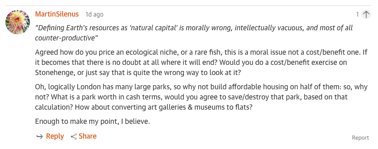. @GeorgeMonbiot is extremely well-argued here but I have two main points of disagreement: 1) I think he makes the same price/value conflation that he criticizes, and 2) I think he’s evaluating a tool for analysis using the standards of activism. A thread… https://www.theguardian.com/commentisfree/2018/may/15/price-natural-world-destruction-natural-capital
On 1, just as economists are criticised for missing the distinction between the price of something and its underlying value, this article confuses valuation (a conceptual value of a natural object or function) and a price on nature (an actual market, say for biodiversity offsets)
A study on the value of bees does not mean that all bees (or even bee habitat) is for sale. Who is the owner? Who would be the seller? These studies exist precisely because there is no market.
And keep in mind that we have *actual* prices for many parts of nature. We literally sell plants and animals, both alive and dead, and literally sell land with whatever ecosystems are on it. What's new is saying that these prices only capture a limited value.
On 2, it’s true that environmental valuation is not an effective tool for nature conservation but that’s not really the intention. It is a tool for decision-making, or more precisely it is an information tool that can be used when facing difficult trade-offs.
If you think environmental valuation should inspire & motivate (including the example of raising NGO funds mentioned in the article), or if you think valuation should always lead to the outcome you want, then of course it won’t get your support. But there are other considerations
Trade-offs exist, even for environmental issues. I struggle with these all the time, especially as someone who writes on enviro issues with policy recommendations. Yet many commenters seem to think there is never(!?) a trade-off when a park or any “natural” space is involved.
An aside: I think this activist/analyst distinction is an important one to think about different tools used in environmental policy. @drvox is second to none about the reverse case of misjudging activism (see Vox blogs on Keystone, Citi climate report, & LSE supply side paper).
I don’t think this distinction in approach needs to be applied to actual people, however. We all face trade-offs and we all have underlying values. Yes, even economists. https://unlearningeconomics.wordpress.com/2012/09/09/value-judgments-in-economics/ A (seemingly endless) debate for another day perhaps. /end

 Read on Twitter
Read on Twitter


